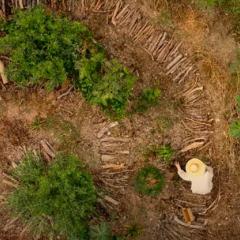Rodríguez-Cruz: Puerto Rican farmers should have access to USDA programs in Spanish
Editor's note: the following story originally appeared in Yale Climate Connections, written by Luis Rodríguez-Cruz.
For more than a month, I’ve been trying to get a hold of someone at the United States Department of Agriculture Farm Service Agency’s Puerto Rico state office. Someone told me they passed my message to the director. I also sent emails to various employees, with no response.
I wanted to get in touch with the office after hearing from a farmer that most of the agency’s paperwork is in English and that agents are hard to reach. My experience was a case in point — an example of how hard it is for farmers in Puerto Rico to get help preparing for climate change in the language that they speak.
“I am lucky that my son is young and understands the internet. Imagine other farmers who do not have that help,” an older Puerto Rican farmer told me about trying to navigate the programs and opportunities from both the USDA’s Farm Service Agency and Natural Resources Conservation Service.
Given that Puerto Rico is a U.S. territory, the USDA is the overseer of such programs. Nonetheless, much of the decision-making is done in Washington, D.C., and it leaves a lot to be desired.
Preparing for climate change
For seven years, I have been working with farmers, farmworkers, Cooperative Extension agents, and various nongovernmental and governmental stakeholders on issues related to Puerto Rico’s food system. Projects I have led and collaborated on have resulted in data from over 500 farmers on different aspects related to sustainability, food security, and climate adaptation.
One key finding from these projects is that farmers who had stronger networks and safety nets, such as being participants in agency programs, tended to recover their farms faster after extreme weather events, such as with 2017’s Hurricane Maria, which damaged over 80% of Puerto Rico’s agriculture.
But the farmer I spoke to, like many others in Puerto Rico and across the rural U.S., faces technological challenges and other barriers, such as having limited English proficiency or having to travel long distances to USDA offices. That can limit farmers’ capacity to access various documents and USDA programs for climate adaptation and sustainable agricultural production.
In many conversations with farmers, I hear how they usually decline to participate in and take advantage of the diversity of programs and products from the USDA, such as access to credit, grants for technologies and infrastructure, technical support to implement conservation and sustainable practices, and other opportunities, due to the level of paperwork, distance to an office, and because many of these processes involve some level of English fluency.
The USDA is bound by law to support clients who are not proficient in English, and there are many documents translated into Spanish, such as some Farm Service Agency’s programs’ fact sheets. But oftentimes, the process of finding or accessing them is burdensome.
The USDA Farm Service Agency website for the Puerto Rico office does not offer translation to Spanish, and the tab to locate county offices as of this writing is not working.
Farm Service Agency’s employees provide support in filing applications but require farmers to go to their offices to apply for most programs, register farms, and for other types of paperwork. A farmer from the mountainous and agricultural municipality of Utuado, located in the center of the main island, told me that he hesitates to drive more than an hour through curvaceous roads to reach the closest office.
USDA Sec. Tom Vilsack is not unaware of the difficulties many farmers across the U.S. face to access or take advantage of USDA programs. In his address during the announcement of the USDA’s framework for transforming food systems, Sec. Vilsack underlined how historically marginalized and underserved farmers have difficulty in accessing information about the agency’s programs. He announced funding through partnerships with multiple on-the-ground organizations to provide information to farmers to broaden USDA’s reach.
This administration also has striven for equity through initiatives like the Justice 40, which is designed to direct 40% of certain federal investments to communities that are marginalized, underserved, and polluted.
Nonetheless, if these cannot be accessed by those who farm our lands, particularly those in the rural U.S. and in U.S. territories, then the action goes in vain. In Puerto Rico, where over 90% of the population does not speak English at home, having access and opportunities to process paperwork in their primary language would be a huge step to address equity.
“People [at USDA] are helpful, they want to help,” another farmer told me when I asked him about his experience.
The USDA’s Farm Service Agency has a committed workforce that often must navigate difficult processes and lack tools to reach more people. The USDA can leverage its networks with land grant institutions, nongovernmental organizations, with Puerto Rican partners and institutions and their own better support their workforce in Puerto Rico to improve its reach to farmers who constantly deal with compounded climate impacts, such as increasing temperatures, droughts, and hurricanes, besides transportation and technological challenges. The agency should tailor its services and outreach dynamics to reflect the farmer populations they are serving.
In Puerto Rico, the average farmer is 61 and has a household income of less than $20,000. Almost half of all Puerto Rican farms are less than 20 acres. Broadening their participation in USDA programs by providing accessible applications, extending technical support, allowing processes to be done by phone or in collaboration with other organizations, and translating documents to Spanish could enhance the production capacity and safety nets of these farmers in the Spanish-speaking U.S. territory that imports over 80% of its food. All of these changes are key to improving equity.
Dr. Luis Alexis Rodríguez-Cruz is a food systems scientist and writer based in Puerto Rico. He is a 2023 Public Voices fellow on the Climate Crisis with the Op-Ed Project in partnership with the Yale Program on Climate Change Communication. Luis also publishes La Fiambrera, his weekly Spanish newsletter on food systems topics.


